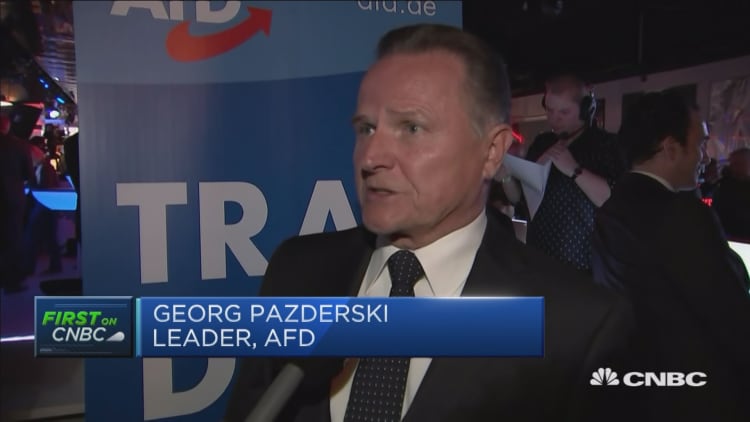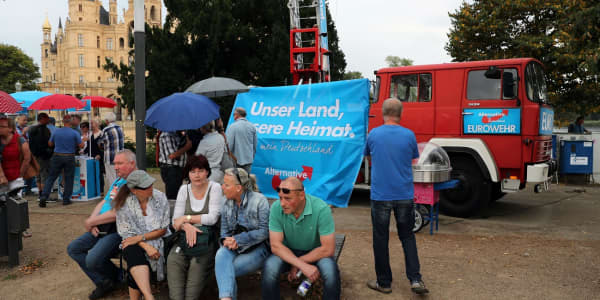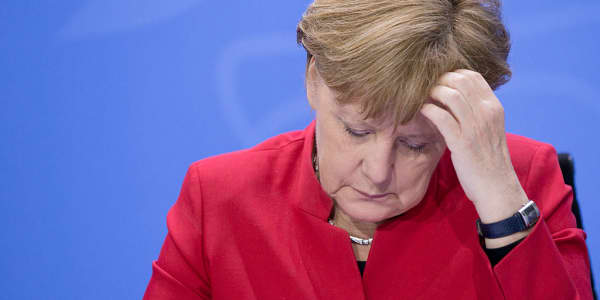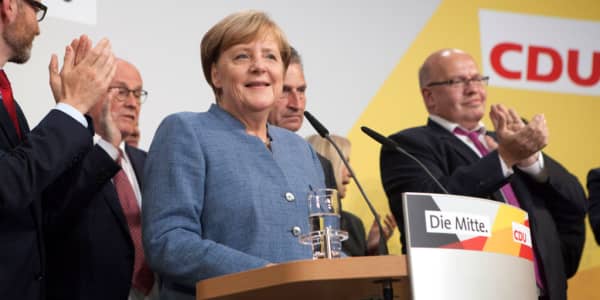
The German parliament will see changes in tone and legislative issues as the Christian Democratic Union faces tough coalition choices after a far-right party won a surprisingly large percentage of the overall vote, according to George Pazderski, leader of the far-right Alternative for Germany (AfD) party's Berlin unit.
"I think it's a political earthquake for Germany. For the first time after 70 years, a new conservative-liberal policy will join the German parliament right beside the Christian Democrats and this is something very special," Pazderski told CNBC in an interview.
"This means that there will be a change in German policy, there will be a change also in the work, or as far as the work in the German Bundestag (or German parliament) is concerned."
The AfD stunned the establishment by finishing third and entering parliament for the first time, with 13.5 percent of the vote. Under Germany's mixed-member proportional voting system, that vaults in well beyond the 5 percent threshold needed for seats in parliament.
Chancellor Angela Merkel's CDU and Bavarian allies, the Christian Social Union (CSU), won 32.5 percent of the vote, making them by far the largest parliamentary group, according to an exit poll for the broadcaster ARD, but that is down from 41.5 percent in the last election in 2013 and lower than recent polling. Their closest rivals, the center-left Social Democrats (SPD), slumped to 20.0 percent, a new post-war low.
Merkel now needs to work to form a coalition reportedly without the SPD, a process that will likely involve protracted negotiations.
The political realignment raised concerns of a hard lurch to the right in Germany, but Pazderski brushed off questions that the party represents a turn toward divisive politics.
"This is a misunderstanding. Our party is not really right wing," he said.
"This is a typical behavior of our parties that we have in the Bundestag. If you want to stigmatize a party, then you put out the Nazi wording and say these are Nazi, these are 'right-wing' don't vote for them because of our history," he said.
He added that "we will show the Bundestag that we are a normal conservative-liberal party and we will really make, or we try to make to bring good politics so that we are bringing those topics to discussion that are necessary to be discussed."
Despite Pazderski's denials, the party has built its political manifesto on traditional values and appeals to voters with a nostalgic view of the country. Its key election themes have been anti-immigration, promoting family values, internal security, leaving the euro and promoting German culture.
While its website features pictures of German towns and cities with the slogan: "It's about us, our culture, our home, our Germany," the party has used more explicit and controversial slogans and posters too, including those proclaiming "Get your country back!" Others have called for "bikinis instead of burkas" referring to the full-body covering some Muslim's wear, and "Islam does not fit our kitchen" on a poster depicting a piglet, referring to Islam's dietary prohibition of pork.
Other posters showed groups of silhouetted migrants with the slogan "The Germans will not finance a better life for you." Another shows a pregnant woman with the slogan "New Germans? We'll make them ourselves."
—CNBC's Holly Ellyatt and Matt Clinch contributed to this article.





